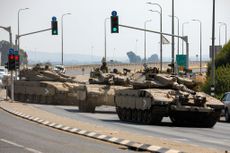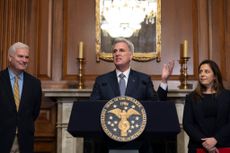Ten Things You Need to Know Today: 9 October 2023
The Week’s daily digest of the news agenda, published at 8am
A free daily digest of the biggest news stories of the day - and the best features from our website
Thank you for signing up to TheWeek. You will receive a verification email shortly.
There was a problem. Please refresh the page and try again.
1. Gaza 'pummelled' after attacks
Around 1,000 people have been confirmed dead in Israel and Gaza following a co-ordinated assault by Hamas militants. Rescue teams said they have found 260 bodies at a music festival which was attacked by Hamas. "It is by far the worst day in Israeli history," said spokesperson for the Israel Defense Forces, Lieutenant Colonel Jonathan Conricus. "Never before have so many Israelis been killed by one single thing on one day." Gaza has been "pummelled" by Israeli airstrikes, said The Guardian, with local officials reporting at least 413 deaths, including 78 children.
2. Starmer would scrap Rwanda
Keir Starmer has said that a Labour government would scrap the Rwanda policy even if it proved successful in reducing Channel crossings. Asked by the BBC if he would ditch the scheme regardless of its effect, he said: "Yes, I think it’s the wrong policy, it's hugely expensive, it's a tiny number, a tiny number of individuals who would go to Rwanda, and the real problem is at source." The government is hopeful that the Supreme Court will approve its Rwanda plan because of previous rulings by its president, which have warned against over-interpretation of human rights laws.
3. Prisons on brink
Prisons in England and Wales are "bust" of space and may run out of places to house offenders within days, according to the leader of Britain’s prison governors. There were only around 300 spaces left in men's prisons as the number of inmates passed 88,000 on Friday, the highest figure since records began in 1900 and a rise of 10,000 in two years, said Andrea Albutt, president of the Prison Governors' Association. It means male jails are running at more than 99.6% of capacity and women’s prisons are at 96%, noted The Telegraph.
Subscribe to The Week
Escape your echo chamber. Get the facts behind the news, plus analysis from multiple perspectives.

Sign up for The Week's Free Newsletters
From our morning news briefing to a weekly Good News Newsletter, get the best of The Week delivered directly to your inbox.
From our morning news briefing to a weekly Good News Newsletter, get the best of The Week delivered directly to your inbox.
4. Breathing space for Metro
Metro Bank has agreed a deal with investors that it says will secure its future following reports it needed to raise cash to shore up its balance sheet. The UK lender said it had raised £325m in new funding, as well as refinancing £600m of debt. The deal "should give the UK challenger bank some breathing space" and "fill a capital hole that had prompted talks with regulators", said the Financial Times. NatWest, Santander and Lloyds Banking Group have all considered bids for some of the bank's assets.
5. Afghanistan search continues
Rescuers in Afghanistan are struggling to recover people from the rubble left by a powerful earthquake that struck the west of the country. More than 1,000 people are feared dead after the 6.3-magnitude quake hit villages in Herat Province on Saturday. Rescue workers are urging the international community to send emergency teams to the "impoverished South Asian country", which "lacks a robust disaster management agency" and other resources since the Taliban regained power two years ago, said Al Jazeera.
6. Call for obesity plan
Family doctors should go into schools to warn pupils about the dangers of fast food to combat the UK’s obesity crisis, according to a leading medic. Dr Jay Verma, a London-based GP and a leader at the Royal Society of Medicine, said a new national scheme could mirror the police programme where officers advise children on how to stay safe on the streets. More than one in 10 reception age children (age 4-5) were obese in 2021/22 and by year six (age 10-11) almost a quarter were obese, according to the National Child Measurement Programme.
7. Oil up on Middle East fears
Oil prices rose by 4% this morning amid fears that the conflict in Israel and Gaza could disrupt output from the Middle East. West Texas Intermediate, the benchmark for US oil, rose to more than $86 (£70) a barrel. The BBC said the price of Brent crude also "surged" in early Asian trading. Although the Israel and Palestinian territories are not oil producers, an energy analyst told the broadcaster that "the risk premium on oil is rising due to the prospect of a wider conflagration that could spread to nearby major oil producing nations such as Iran and Saudi Arabia".
8. Met catches 'kingpins'
Senior organised crime "kingpins" are among the more than 400 criminals have been jailed for a total of 3,722 years after a Metropolitan Police operation targeted the EncroChat encrypted messaging platform. It was "the most significant operation targeting organised crime figures in the Met's history", said commander Paul Brogden, head of specialist crime at the Met. Naki Aslan, 39, a leading gang member, was sentenced to 23 years in prison for conspiring to import in excess of 20kg of heroin and cocaine as part of the operation.
9. Young 'go private'
Thousands of young people are seeking private healthcare as they turn their back on the NHS in a "generational shift", said The Times. According to patient groups and health leaders, problems accessing NHS care are changing the relationship that people had with the health service. Younger adults are more positive about the private sector, according to the poll by the Independent Healthcare Providers Network, which found that 41% of respondents aged 18 to 24 said they had used private healthcare, the highest proportion of any age group.
10. Work harassment up
Nearly one-third of workers said they have suffered sexual harassment in their job, but only half of those affected were sufficiently confident to report it, a survey has found. Researchers, who questioned 2,000 UK employees, found that victims described feeling "violated, intimidated, ashamed, degraded and scared" after suffering "groping, stroking, [or] inappropriate comments". They were also threatened that their careers would be harmed if they did not return sexual advances. The Barrister Group, which commissioned the research, said "the fact that sexual harassment is still so prevalent in the workplace" is "hugely disappointing".

Continue reading for free
We hope you're enjoying The Week's refreshingly open-minded journalism.
Subscribed to The Week? Register your account with the same email as your subscription.
Sign up to our 10 Things You Need to Know Today newsletter
A free daily digest of the biggest news stories of the day - and the best features from our website
-
 10 things you need to know today: October 8, 2023
10 things you need to know today: October 8, 2023Daily Briefing Israel battles Hamas as hundreds dead on both sides, Western world pledges to support Israel during war, and more
By Justin Klawans Published
-
 10 things you need to know today: October 7, 2023
10 things you need to know today: October 7, 2023Daily Briefing Israel 'at war' with Hamas following deadly surprise attack, Chuck Schumer leads bipartisan congressional delegation to China, and more
By Justin Klawans Published
-
 10 things you need to know today: October 6, 2023
10 things you need to know today: October 6, 2023Daily Briefing Trump endorses Jim Jordan for House speaker, Iranian rights activist Narges Mohammadi wins Nobel Peace Prize, and more
By Harold Maass Published
-
 10 things you need to know today: October 5, 2023
10 things you need to know today: October 5, 2023Daily Briefing Jordan and Scalise launch bids to become House speaker, Kaiser Permanente workers walk out, and more
By Harold Maass Published
-
 10 things you need to know today: October 4, 2023
10 things you need to know today: October 4, 2023Daily Briefing Kevin McCarthy ousted as House speaker, judge imposes a partial gag order in Trump fraud trial, and more
By Harold Maass Published
-
 10 things you need to know today: October 3, 2023
10 things you need to know today: October 3, 2023Daily Briefing Trump calls fraud case a 'sham' as trial starts, Matt Gaetz files resolution seeking to oust McCarthy, and more
By Harold Maass Published
-
 10 things you need to know today: October 2, 2023
10 things you need to know today: October 2, 2023Daily Briefing Gaetz tries to oust McCarthy, Newsom picks Laphonza Butler to fill Dianne Feinstein's Senate seat, and more
By Harold Maass Published
-
 10 things you need to know today: October 1, 2023
10 things you need to know today: October 1, 2023Daily Briefing Government shutdown avoided as Congress passes temporary funding bill, Supreme Court to begin new term as major cases await, and more
By Justin Klawans Published










